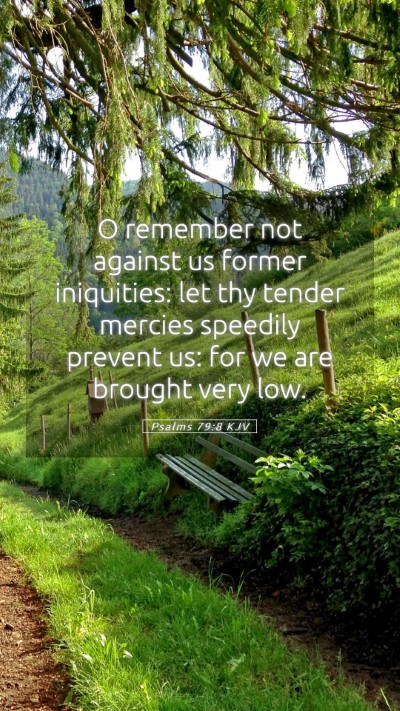Understanding Psalm 79:8
Psalms 79:8 reads: "O remember not against us former iniquities: let thy tender mercies speedily prevent us: for we are brought very low." This verse expresses a plea for divine mercy and forgiveness. Below, we will explore the meaning of this verse through insights from public domain commentaries, focusing on its context, themes, and application.
Bible Verse Commentary and Interpretation
This verse is part of a communal lament, reflecting the sorrow and desperation of the Israelites during a time of crisis. The psalmist intercedes for the people, asking God to overlook their past sins and to show mercy. The following themes are highlighted in the commentaries:
- Divine Mercy: Matthew Henry emphasizes the importance of God's mercy, suggesting that our past sins should not hinder God's willingness to help us when we are in distress.
- Human Fragility: Albert Barnes notes that the Israelites recognize their low state, reflecting a deep awareness of their need for God's intervention amidst suffering.
- Collective Responsibility: Adam Clarke underscores that this verse isn't only about individual sins, but acknowledges a corporate sinfulness that affects the nation as a whole, highlighting the need for communal repentance.
In-Depth Analysis of Themes
The plea of the psalmist serves multiple functions:
- Request for Forgiveness: The opening phrase reflects a yearning for God to forget previous iniquities, indicating a desire to start anew in His presence.
- Recognition of Desperation: The acknowledgment of being "brought very low" illustrates a state of desperation, emphasizing the urgency for God's action.
- Intercession: This psalm serves as an intercessory prayer on behalf of the community, reflecting a deep-seated belief in the power of communal appeals to God.
Application of Psalm 79:8 to Daily Life
Understanding this verse can offer valuable lessons for believers today:
- Seeking Forgiveness: Just as the psalmist asked for God's mercy, Christians are encouraged to embrace God's forgiveness and seek it earnestly when they recognize their shortcomings.
- Crisis as a Catalyst for Prayer: In times of trouble, recalling this passage can remind individuals to turn to God, fostering a deeper reliance on His mercy.
- Community in Repentance: The collective nature of the plea can inspire modern believers to pray for their communities and seek healing together, recognizing shared struggles.
Historical Context
This psalm is believed to have been written during a period of significant turmoil, likely after the Babylonian Exile, when the Israelites faced the consequences of their actions. Understanding this historical backdrop enriches our interpretation:
- Context of Exile: The exiled Israelites grappled with the destruction of their homeland and the severe consequences of their collective disobedience to God.
- Hopes for Restoration: The longing for mercy is intertwined with a hope for restoration and a return to God's favor.
Cross References
Several other scriptures resonate with the themes found in Psalm 79:8:
- Psalm 51:1-2: "Have mercy upon me, O God, according to thy lovingkindness; according unto the multitude of thy tender mercies blot out my transgressions."
- Isaiah 64:9: "Be not angry very sore, O Lord, neither remember iniquity for ever: behold, see, we beseech thee, we are all thy people."
- Lamentations 3:22-23: "It is of the Lord's mercies that we are not consumed, because his compassions fail not. They are new every morning: great is thy faithfulness."
Conclusion
Psalm 79:8 serves as a profound reminder of our reliance on God's mercy, inviting believers to seek forgiveness and restoration in times of distress. By understanding this scripture through the lens of commentaries, one gains deeper insights into divine mercy, communal responsibility, and the importance of prayer.


